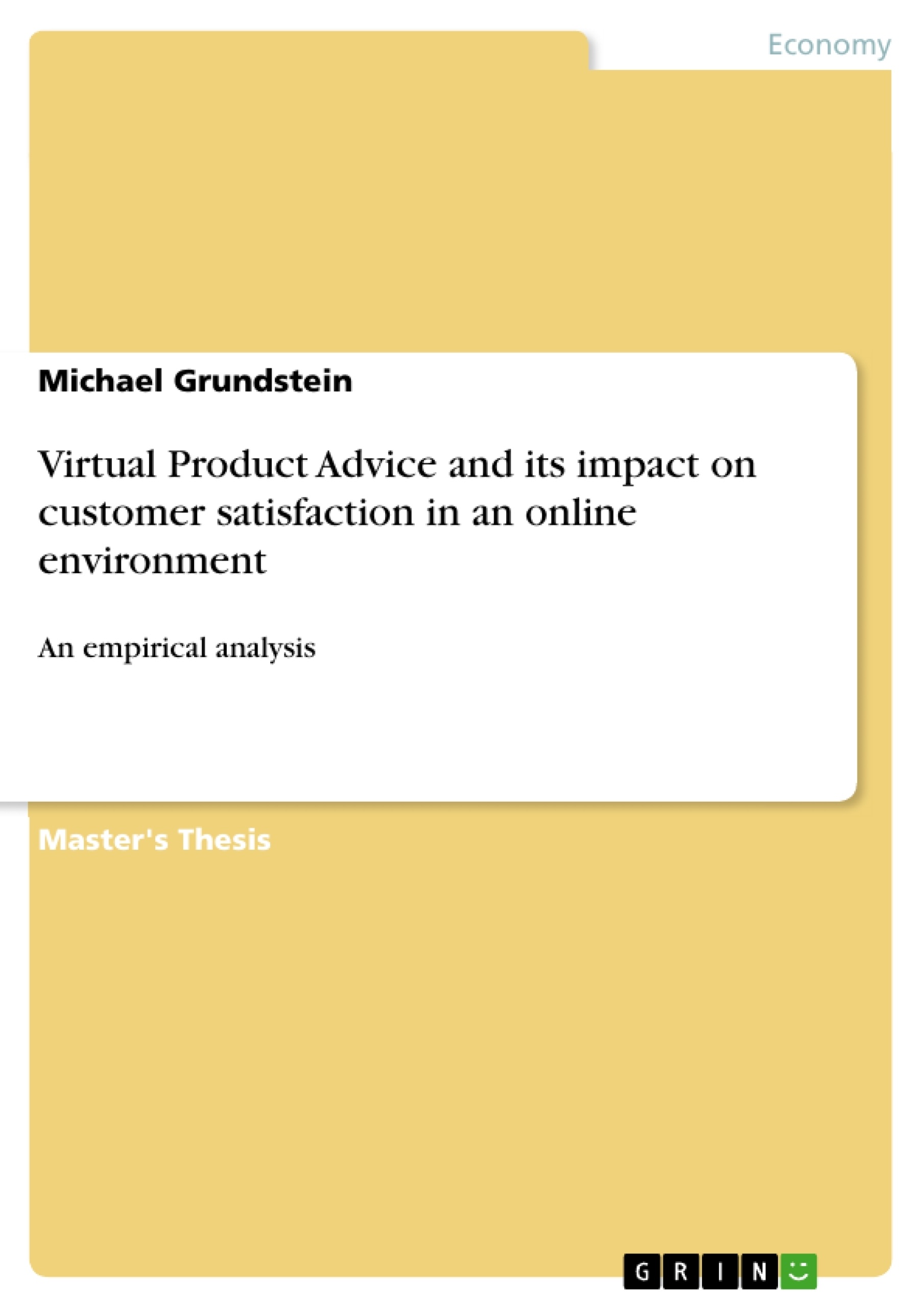Consumers nowadays purchase a variety of products in online shops for different reasons. Certain products involve high involvement decision-making with low purchase frequencies in general. At the same time, virtual shelf space is unlimited and consumers face a variety of products, which exceeds their rational capabilities. This condition requires online shop operators to implement search tools in their web sites that allow consumers to structure and reduce complexity, both on a catalogue and a product level. Consumers in general do not always possess product expertise, especially in the case of low frequency purchases such as digital cameras. Virtual product advisors intend to fill this gap.
The primary objective of the thesis is to investigate the interaction effect between different levels of consumer knowledge and a chosen product search approach. A special focus is put on a virtual product advisor and a facet search as a structuring tool. Based on theoretical work in marketing, psychology, information system management a set of hypotheses was developed pertaining to the interaction effect and how it affects the perceived quality of the online feature of
a product search interface from a consumer perspective.
A randomized experiment with a control group design in a live Online Shop was conducted to test the hypotheses. In sum, the findings suggest a contingency between the consumer
knowledge and a product search interface in regard of the impact on antecedents of esatisfaction. The results provide two different angles from a marketing perspective in terms of
usefulness and from an information system management point of view in terms of usability.
Inhaltsverzeichnis (Table of Contents)
- Abstract
- Introduction
- Theoretical Foundations
- The Concept of Customer Satisfaction in E-Commerce
- Antecedents of E-Satisfaction
- Knowledge and Expertise
- Product Search Interfaces
- Facet Search
- Virtual Product Advisors
- Research Design
- Hypotheses Development
- Experimental Setup
- Data Analysis
- Results
- General Findings
- Hypotheses Testing
- Discussion
- Theoretical Implications
- Managerial Implications
- Limitations and Future Research
- Conclusion
Zielsetzung und Themenschwerpunkte (Objectives and Key Themes)
This thesis aims to investigate the interaction between consumer knowledge levels and different product search approaches in an online environment. Specifically, it examines the impact of a virtual product advisor and a facet search on perceived website quality and e-satisfaction.
- The relationship between consumer knowledge and the effectiveness of product search interfaces.
- The role of virtual product advisors and facet search in structuring and reducing complexity for consumers.
- The impact of product search interfaces on perceived website quality and e-satisfaction.
- The theoretical and managerial implications of the findings for online retailers and information system management.
Zusammenfassung der Kapitel (Chapter Summaries)
- Introduction: This chapter sets the stage for the research by outlining the growing significance of online shopping and the challenges of managing product complexity in a virtual environment. It highlights the need for effective product search tools to guide consumers and enhance their shopping experience.
- Theoretical Foundations: This chapter delves into the theoretical foundations of the research, exploring key concepts like customer satisfaction in e-commerce, antecedents of e-satisfaction, knowledge and expertise, and different types of product search interfaces. It provides a framework for understanding the factors influencing consumer behavior in online shopping.
- Research Design: This chapter outlines the research methodology, including hypotheses development and experimental setup. It describes the study design, data collection methods, and the specific online shop used for the study.
- Data Analysis: This chapter presents the data analysis techniques employed to examine the collected data and test the formulated hypotheses.
- Results: This chapter presents the findings of the study, focusing on the interaction effects between consumer knowledge, product search interfaces, and their impact on perceived website quality and e-satisfaction. It analyzes the evidence gathered through the experiment to validate or reject the initial hypotheses.
- Discussion: This chapter delves into the theoretical and practical implications of the study's results. It discusses the significance of the findings for online retailers and information system management, highlighting potential benefits and limitations of the research.
Schlüsselwörter (Keywords)
This research focuses on the key concepts of complexity, electronic commerce, e-satisfaction, expertise knowledge, means-end chain theory, product search interfaces, usability, virtual product advisors, WebQual, and website quality. The study aims to explore how these factors interact to influence consumer behavior and online shopping experiences.
Frequently Asked Questions
What is a Virtual Product Advisor?
A Virtual Product Advisor is an online search tool designed to help consumers structure and reduce complexity during shopping by providing expert-like guidance, especially for high-involvement products like digital cameras.
How does consumer knowledge affect online shopping satisfaction?
The research suggests a contingency between consumer knowledge and the type of search interface. The impact on e-satisfaction depends on whether the tool (like facet search or an advisor) matches the consumer's level of expertise.
What is Facet Search?
Facet search is a structuring tool in online shops that allows users to filter products based on specific attributes or dimensions, helping to navigate large catalogs efficiently.
What is "E-Satisfaction" in e-commerce?
E-satisfaction refers to the level of customer satisfaction in a virtual shopping environment, influenced by factors like website usability, usefulness of search tools, and perceived quality of the interface.
What are the managerial implications of this study?
Online retailers should implement search tools that cater to different levels of consumer expertise to improve usability and usefulness, ultimately enhancing customer satisfaction and loyalty.
How was the research for this thesis conducted?
The study used a randomized experiment with a control group design in a live online shop to test how different search interfaces interact with consumer knowledge levels.
- Citar trabajo
- Michael Grundstein (Autor), 2013, Virtual Product Advice and its impact on customer satisfaction in an online environment, Múnich, GRIN Verlag, https://www.grin.com/document/308032



